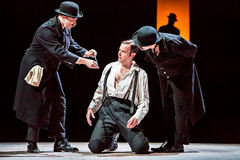| Opera Reviews | 28 April 2024 |
Glass' The Trial gets its Scottish Opera premiereby Catriona Graham |
|
| Glass: The Trial Scottish Opera February 2017 |
|
|
Christopher Hampton’s libretto after Franz Kafka’s novel is sharp and entertaining, and Glass sets it conversationally. Only briefly is there more than one voice singing at the same time, the sparseness of the vocal line emphasising the isolation of the characters. That sparseness is reflected in Simon Banham’s monochrome design– three white-ish walls, a basic bedstead, and office table and chairs variously represent Josef K’s bedroom, the court, the bank and Lawyer Huld’s house. Short musical interludes between scenes with singing allow for scene-changes, indications of time passing and hints at unsettling revelations. Glass’s music lays down insistent, driving, rocking strings, overlaid with wind and periodic disconcerting percussion tick-tocking time away, and conductor Derek Clark keeps the momentum to the end. There are surprisingly lyrical passages, like Josef K’s encounter with Fräulein Bürstner but, from the first moment when the lights show bank clerk Josef K half-awake on the morning of his thirtieth birthday, that rocking motif, interspersed with scales, is heading straight for the dénouement. Nicholas Lester is excellent as Josef K, his psychological collapse as he realises his predicament skilfully portrayed. Initially, he concludes that the two guards (Daniel Norman and Paul Carey Jones) who arrest him – bowler-hatted, trousers comically that half-inch too short, big boots at a Keystone Cops angle – are sent by his friends as a practical joke. If only! The various other members of the cast take the role of watchers when not in role; before CCTV, surveillance was in person. They are present at every stage of Josef K’s life over the next twelve months, as the momentum and absurdity of his situation take over his life. Josef K apart, this is an ensemble piece, with singers doubling, tripling, even quadrupling parts. Paul Carey Jones is the voice of doom as the Prison Chaplain, spelling it out in a parable (or fable) while Ace McCarron’s lighting throws his giant shadow over a cowering Josef K. He has been almost friendly as Willem, one of the arresting guards. Hazel McBain is a coquettish Fräulein Bürstner and Leni, both irresistible for Josef K. Emma Kerr’s highest notes as Frau Grubach are about the only time that subtitles are really needed; her Washerwoman, on the other hand, is only too comprehensible. Michael Drulett almost steals the show as irascible Uncle Albert, trying to help his nephew out of his situation (and the concomitant family disgrace) by taking him to his lawyer friend Herr Huld. Gwion Thomas is a convincing Huld, clearly unwell, but invigorated by a legal problem and relishing the care of his house-keeper Leni. In turn, Leni sends Josef to Titorelli (Elgan Llyr Thomas), who paints portraits of the judges, but to no avail. After The Priest has told his fable, that music drives forward to the guards bringing out Josef, showing him the knife and stabbing him to death.
|
|
| Text ©
Catriona Graham Photo © James Glossop |

 “The verdict is not suddenly announced. It slowly evolves from the proceedings”. These words from the Prison Chaplain not only speak the doom of Josef K, but are a fairly good summing up of The Trial, Philip Glass’s 2014 opera in its Scottish Opera premiere, directed by Michael McCarthy.
“The verdict is not suddenly announced. It slowly evolves from the proceedings”. These words from the Prison Chaplain not only speak the doom of Josef K, but are a fairly good summing up of The Trial, Philip Glass’s 2014 opera in its Scottish Opera premiere, directed by Michael McCarthy.






